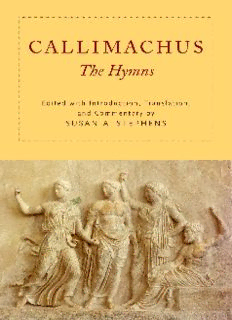
Callimachus: The Hymns PDF
Preview Callimachus: The Hymns
CallimaChus L L CallimaChus ThE hYmNs L L Edited with Introduction, Translation, and Commentary by Susan A. Stephens 1 1 Oxford University Press is a department of the University of Oxford. It furthers the University’s objective of excellence in research, scholarship, and education by publishing worldwide. Oxford New York Auckland Cape Town Dar es Salaam Hong Kong Karachi Kuala Lumpur Madrid Melbourne Mexico City Nairobi New Delhi Shanghai Taipei Toronto With offices in Argentina Austria Brazil Chile Czech Republic France Greece Guatemala Hungary Italy Japan Poland Portugal Singapore South Korea Switzerland Thailand Turkey Ukraine Vietnam Oxford is a registered trade mark of Oxford University Press in the UK and certain other countries. Published in the United States of America by Oxford University Press 198 Madison Avenue, New York, NY 10016 © Oxford University Press 2015 All rights reserved. No part of this publication may be reproduced, stored in a retrieval system, or transmitted, in any form or by any means, without the prior permission in writing of Oxford University Press, or as expressly permitted by law, by license, or under terms agreed with the appropriate reproduction rights organization. Inquiries concerning reproduction outside the scope of the above should be sent to the Rights Department, Oxford University Press, at the address above. You must not circulate this work in any other form and you must impose this same condition on any acquirer. A copy of this book’s Cataloging-in-Publication Data is on file with the Library of Congress. ISBN 978–0–19–978304–5 1 3 5 7 9 8 6 4 2 Printed in the United States of America on acid-free paper Contents LL Preface vii Illustrations ix Abbreviations xi Maps xv Introduction 3 1. The Hymn to Zeus 47 2. The Hymn to Apollo 72 3. The Hymn to Artemis 100 4. The Hymn to Delos 157 5. The Hymn to Athena On the Bath of Pallas 233 6. The Hymn to Demeter 263 Works Cited 299 Index of Subjects 307 Index of Selected Greek Words Discussed 311 Index of Passages Discussed 313 Preface LL My goal in writing this commentary is to provide readers with a convenient and accessible edition of all six of Callimachus’ hymns in one volume, accompanied by notes sufficient for ease of reading. That such an edition does not already exist is my justification for undertaking the task, especially given the importance of this poet and the fact that the hymns and epigrams are his only complete works. In keeping with Callimachus’ own stated poetic practice this is not a μέγα βιβλίον; thus constraints of space have required a certain amount of triage: the linguistic, metrical, historical, geographic, and cultic material I provide will necessarily lack the wealth of scholarly detail provided by those commentaries on individual hymns produced mainly in the 1970s and 1980s. Like all writers of commentar- ies I have depended heavily on my predecessors, though experience in teaching and in writing on the hymns has led me considerably to reduce the amount of linguistic detail (particularly about Homeric usage) and commensurately to in- crease parallels from tragedy and lyric. Also I situate Callimachus’ divinities as much as possible within the context of cult practices relevant to early Ptolemaic Alexandria and Cyrene. I have tried to keep always before the reader the fact that Callimachus was a poet; thus literary parallels are selected in the main for their al- lusive potential and references kept, when possible, to easily accessed secondary materials. The translations do no more than aim for clarity and are intended to provide the reader with my understanding of the text. It is my pleasure to acknowledge the colleagues who have offered encourage- ment, advice, and the generous donation of their time in reading various versions of this manuscript. Richard Martin has patiently enlightened me about many Ho- meric minutiae. Jim Clauss and Alex Sens have provided comments on individual hymns, but I am especially grateful for their perceptive advice about rethinking the shape of the whole. Keyne Cheshire, Ivana Petrovic, and Massimo Giuseppetti read and commented on individual hymns, and in addition provided me with their own work in advance of publication, from which I learned more than I can say. Flora Manakidou has very generously provided me with her forthcoming work on viii Preface the Hymn to Athena and with a copy of her 2013 commentary. Dirk Obbink and Daniela Colomo very kindly facilitated my examination of hymns papyri. Israel McMullin has given me the student’s perspective on what is useful (or more often, not); Jon Weiland has drawn the maps. Aaron Palmore and John Richards have helped with the proof reading. Andrew Dyck has done an exemplary job of edit- ing and indexing (what errors remain are my own). Mark Edwards has read and commented on the whole and been particularly helpful with the metrical sections and in providing Homeric parallels. All of these individuals have facilitated the process of writing this commentary. However, I owe a special debt of gratitude to Marco Fantuzzi and Benjamin Acosta-Hughes, who have read through the whole manuscript more than once. Their learned advice has considerably improved what I now present, and I hope that in some measure it repays their efforts. Last but not least, I would like to thank the Press for their patience and support. Illustrations LL 1. Hieroglyphic for king of Upper (sedge) and Lower (bee) Egypt. Detail of the Rosetta Stone. © The Trustees of the British Museum. 68 2. Cyrene Apollo. © The Trustees of the British Museum / Art Resource, NY. 88 3. Chariot carrying kalathos: coin, Catalogue 30.552. © The Trustees of the British Museum. 276
Description: